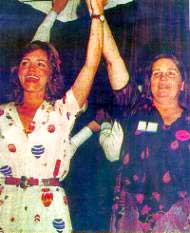

Sutton was born in 1940, and was a Junior in High School when she started her first job, working a 4-midnight shift at the JP Stevens plant. Sutton spoke of wanting to join the army and see the world. However, she was raised in a mill town, where all seven mills were owned by JP Stevens. These mills employed both her grandparents, her mother, and her father. The local high school she attended even had courses for weaver training and how to work fixing the looms in the local factorys. Work in these mills was almost inevitable for members raised in the community, following through generations.
In the 1970s, the textile mills were the only major US industry that was not largely unionized. The Textile Workers Union of America made its first appearance in Roanoke Rapid while at the age of 33, a mother of 3, she was earning $2.65 hourly in the mill; on her second marriage, Sutton was not new to struggle. Her first husband died in a car accident when she was only 20 with a four month old baby.
In 1973, Crystal saw a union poster in the mill for the first time, and all she could think about was the poor wages, the exhaustion of the work, and the little benefits she was suffering from and that she had watched her parents suffer from.
She attended her first union meeting, thinking of her children's future. The meeting was held in a Black church, and she was one of only two white citizens present. She became extremely passionate about the unionizing effort, holding union meetings in her home and talked about the efforts with other workers whenever she could. Eli Zivkovich, sent by TWUA to organize in Roanoke rapids, later stated that in his 20 years of work, "he had never known anyone who matched Sutton's zeal".
Being preached anti-union rhetoric since childhood in church and school, the town ostracized her. The union was taught to be a tool for black power, and a union victory would have shut down all the mills, leading to mass unemployment for all of the residents. After months of trying to organize coworkers, she was fired, and the police, provoked by the factory's management, came to arrest her.
As the police approached her during a work day, she took a piece of cardboard and wrote "union" in all caps, stood on her worktable, and held it up high. The workers slowly cut off their machines.
A year later, ACTWU gained the right to represent 3,000 employees including Sutton. In 1977, a court ordered that Sutton be rehired and receive her wages since she was arrested. She clocked in for two days, quit, and went to work as an organizer. '
After more than a decade of organizing, she earned a certification for nursing assistance in 1988. Eventually, she ran a day care center out of her home.

No comments:
Post a Comment